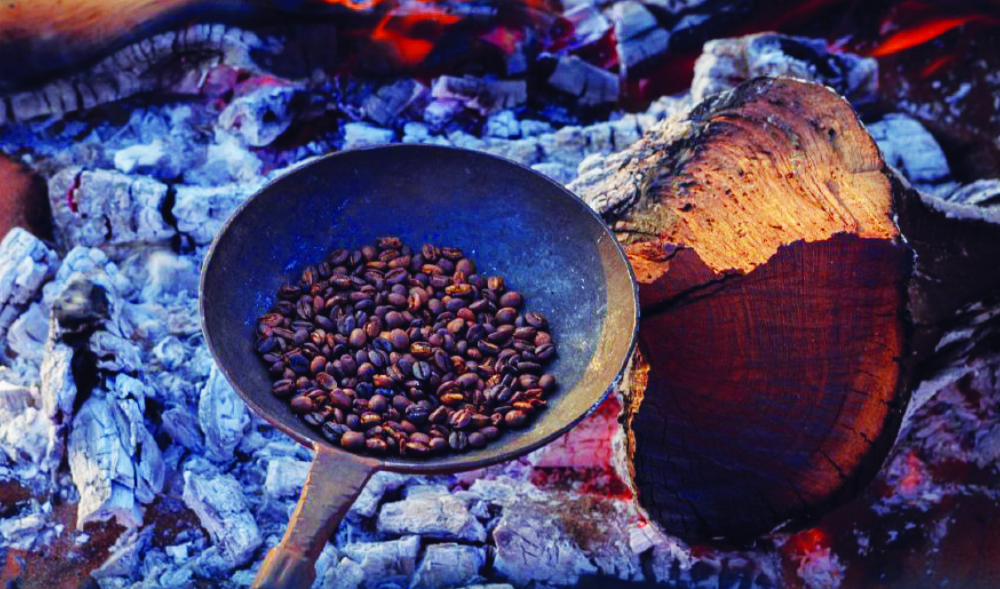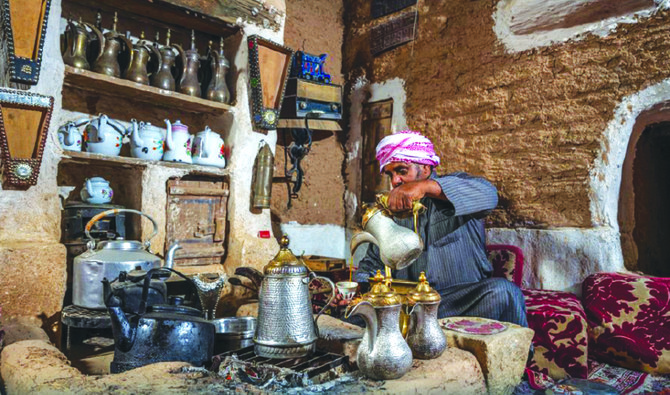MAKKAH: The Kingdom’s Ministry of Culture has designated 2022 as “The Year of Saudi Coffee,” celebrating the authentic taste of a local household staple.
Saudi Minister of Culture Prince Badr bin Abdullah bin Farhan said that the “Saudi Coffee Initiative” would be the umbrella under which all celebrations would gather as an essential component of the Kingdom’s culture.
In the past few years, coffee bean farms in Jazan have been given special attention as support for farmers has increased, and special care has been given to the Khawlani bean.
Gibran Al-Maliki, the owner of a coffee bean farm in Al-Dayer in Jazan, famous for its abundance of coffee bean farms, said that the announcement was a great honor and would be a beacon for those interested in the coffee industry.
He told Arab News that the coffee bean was once considered essential to the ancient Khawlani coffee drink and had been revived in recent years.
Al-Maliki said that the region went through a period of drought and low rainfalls last year, which affected many coffee bean farms as the crop requires a lot of watering. He said that most farmers could not irrigate using water tanks due to the difficult topography of the region. The farms were located in a rugged mountainous area, making it difficult to establish a stable irrigation system.
Khaled Hashem Nagro, general manager of Renad Arabia for Events Management, said that each region was distinguished from other regions in producing Arabian coffee — whether through the taste, the composition of flavors or through roasting.
During the collection process, coffee beans are given special care; they differ in color depending on type — they are found in yellow, black and brown shades. Farmers cultivating the beans discard very dark or black beans or those in direct sunlight, which can affect the taste. Flavors are also dependent on the topography and nature of the regions.
BACKGROUND
• The coffee bean tree is grown in 70 countries worldwide and is an important source of income. However, in Yemen and southern Saudi Arabia, the coffee produced is considered one of the most delicate types of coffee.
• Yemen witnessed centuries-old commercial deals with the Dutch and the British to export coffee beans.
The beans are roasted over a light fire, with the exception of the Bahri, which requires intense fire.
There’s the Khawlani, Berri, Harari, and Bahri (imported from Brazil or Turkey) bean.
The finest type of coffee is the Khawlani, which is divided into two categories. The first is the “Qatma” (with small coffee beans), which is organic and only found in the high mountains of Khawlan of Yemen. It is rare, in high demand, and expensive. The second category is the long grain of Khawlani, cultivated in most Yemeni regions.
After the roasting process, the coarse powder, mixed with crushed cardamom, is boiled in water, and no sugar is added. Condiments can be also be added to the mix, such as cardamom or saffron, sometimes even mastic and amber, depending on personal preference.
For as long as anyone can remember, drinking Arabic coffee has been a common social habit and an integral part of Saudi culture.
“Choosing the source of the coffee is very essential and gets reflected in its quality and taste whether being Khawlani, Harari, Brazilian, etc.,” Nagro told Arab News. “These types are now available in every Saudi household and people prepare it in their own way. Every region serves coffee in its traditional way that distinguishes it from others, and this contributes to a diversity of tastes.”
The researcher and former head of the Culture and Arts Association, Abdullah bin Abdullah Al-Saad, said that Arabian coffee symbolizes authentic Arab celebration and generosity.
“It’s a delicious and common drink presented to their guests as an expression of generous hospitality and of honoring,” Al-Saad said.
“Some coffee beans are considered ordinary, and others are regarded as luxurious and extravagant in taste.”
The coffee tree is grown in 70 countries worldwide and is an important source of income. However, in Yemen and southern Saudi Arabia, the coffee produced is considered one of the most delicate types of coffee. It is world-renowned, as Yemen witnessed centuries-old commercial deals with the Dutch and the British to export coffee beans.
Throughout the year, we have heard many success stories coming from the southern region of Jazan, specifically about coffee bean farms and farming. We’ve seen small family businesses boom into fully fledged large companies exporting their beans across the nation, festivals, workshops, as well as youth training in the processes of coffee farming, cultivating, packaging, and even barista training.
Last month, the Ministry of Environment, Water and Agriculture signed an agreement to establish a coffee development city in the Al-Baha region’s Mashuqa and Al-Qara governorates.
The city will be built in an area totaling 1,600,000 sqm and will have the operational capacity to provide 1,000 job opportunities and plant 300,000 coffee trees.





























